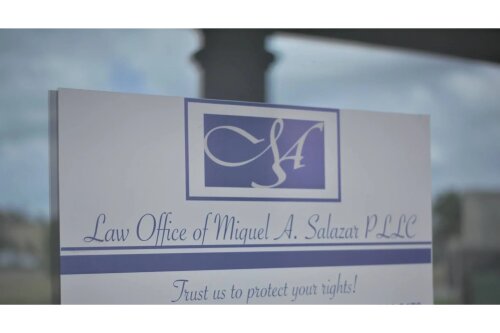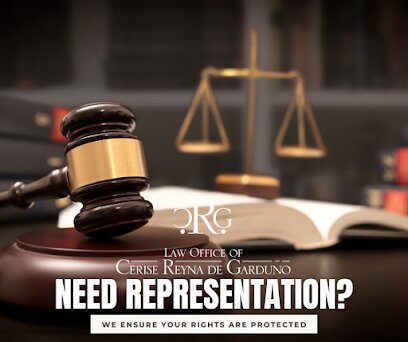Best Workers Compensation Lawyers in Brownsville
Share your needs with us, get contacted by law firms.
Free. Takes 2 min.
List of the best lawyers in Brownsville, United States
About Workers Compensation Law in Brownsville, United States
Workers compensation is the system that provides medical care and financial benefits to employees who are injured or become ill because of their job. In Brownsville, which is in Cameron County, Texas, workers compensation claims are governed by Texas law and administered by the Texas Department of Insurance - Division of Workers' Compensation. The system is designed to provide relatively fast, no-fault benefits for job-related injuries while limiting employer liability for most negligence claims. Because Brownsville is a border community with many industries - including manufacturing, construction, healthcare, retail and shipping - workplace injuries range from slips and falls to repetitive motion injuries and industrial accidents.
Why You May Need a Lawyer
You do not always need a lawyer to file a workers compensation claim, but an attorney can be important in many situations. You may need a lawyer if:
- Your claim is denied or benefits are delayed and informal appeals have not worked.
- Your employer denies that the injury is work-related or claims it is not covered because the employer is a non-subscriber.
- You have a permanent impairment or complex medical issues that affect your ability to work and the correct value of your disability benefits is disputed.
- You face a contested medical dispute - for example the insurer is refusing necessary treatment or the choice of treating doctor is being restricted.
- You are being retaliated against, demoted or fired after reporting a workplace injury.
- Your case involves a third party - for example a defective machine or negligent contractor - and you may have a separate personal injury claim in addition to workers compensation benefits.
- You need help understanding settlement options and whether a lump-sum settlement is fair given your future medical needs and loss of earning capacity.
An experienced workers compensation attorney in Texas can evaluate the strengths of your case, help preserve important deadlines and represent you in benefit review conferences, contested case hearings and negotiations.
Local Laws Overview
Key aspects of Texas workers compensation law that are particularly relevant in Brownsville include the following:
- Optional employer coverage - Unlike most states, Texas allows private employers to choose whether to subscribe to the state workers compensation system. Employers who subscribe provide benefits through an insurer and are generally protected from ordinary negligence lawsuits by employees. Employers who do not subscribe - non-subscribers - do not provide workers compensation benefits and can be sued directly by injured workers under negligence or other theories.
- Administration by the Texas Department of Insurance - Division of Workers' Compensation - The Division oversees benefit delivery, informal and formal dispute resolution, and rules for medical treatment and vocational rehabilitation.
- Types of benefits - For covered claims you can seek medical benefits and income benefits including temporary income benefits for lost wages while you recover, impairment income benefits for permanent impairment, supplemental income benefits for partial disability in some cases, lifetime income benefits for very serious injuries, and death benefits for eligible survivors.
- Doctor choice and medical management - The employer or insurer may have a network or designated doctor rules that affect who treats you for your work injury. There are specific procedures for seeking authorization of care and appealing medical disputes.
- Dispute process - If there is a disagreement you can pursue informal resolution, a benefit review conference, and then a contested case hearing before the State Office of Administrative Hearings. Administrative appeals follow and some limited judicial review is available.
- Time-sensitive actions - There are important timeframes for reporting injuries, requesting benefit reviews and filing appeals. These deadlines can affect your rights, so prompt action is critical.
- Retaliation and employment rights - Federal and state laws protect some employee rights against retaliation for reporting injuries, but remedies and procedures vary depending on employer coverage and the facts of the case.
Because Texas law and agency rules can be technical and time-sensitive, it is advisable to confirm specific deadlines and procedures with a lawyer or the Division of Workers' Compensation as soon as possible after an injury.
Frequently Asked Questions
What should I do immediately after a work injury?
Get medical attention right away if you have a significant injury. Report the injury to your employer as soon as possible - oral notice is usually required promptly and written notice may also be needed depending on circumstances. Keep records of the date, time and location of the accident, the names of witnesses, and any medical treatment you receive. Preserve pay stubs and job descriptions. Quick action helps protect your right to benefits.
How do I know if my employer provides workers compensation?
Ask your employer or your supervisor whether the company subscribes to Texas workers compensation insurance and who the insurer is. Employers who subscribe must post information about the workers compensation system at the workplace. If the employer does not carry coverage, you may be in a different legal position and a lawsuit may be an option.
Can I choose my own doctor for treatment?
Texas rules about choosing a doctor depend on whether the employer subscribes to workers compensation and the employer's medical management rules. Many employers have designated doctors or networks. If you are unsure, seek emergency care first and then confirm with your employer or the insurer about approved treaters. If a medical dispute arises, there are procedures under the Division of Workers' Compensation to challenge treatment denials.
What kinds of benefits can I receive?
If your claim is covered you can typically receive medical benefits for necessary and reasonable treatment, and income benefits for lost wages when you are unable to work. Income benefits come in different forms - temporary wage benefits while you recover, impairment benefits for permanent injuries, supplemental benefits in certain cases, and lifetime benefits for very severe injuries. Death benefits may be available to dependents of workers who die from job-related injuries.
My claim was denied - what can I do?
If the insurer denies the claim, ask for a written explanation of the denial and the reasons. You can request an informal conference, ask for a benefit review conference through the Division, and, if necessary, proceed to a contested case hearing. Consult a workers compensation attorney to evaluate the denial and represent you during disputes. Acting quickly is important because deadlines apply.
What if my employer says they are a non-subscriber?
If your employer does not carry workers compensation insurance, you do not have the normal state-administered benefits. Instead, you may be able to bring a civil lawsuit against your employer for negligence or other legal theories. Non-subscriber cases can be complex and may require immediate legal advice about evidence, notice and applicable statutes.
Will I be paid my full salary while I am off work?
Workers compensation income benefits replace only a portion of your regular wages, not your full salary. The amount is calculated under state rules and is typically a percentage of your average weekly wage subject to state maximums and minimums. The exact replacement rate and caps change over time, so consult the Division or an attorney for current figures.
Can I sue a third party in addition to getting workers compensation?
Yes. If a third party - such as a negligent contractor, equipment manufacturer or driver - caused or contributed to your injury, you may have a separate personal injury claim against that party in addition to workers compensation benefits. Those third-party claims can seek full damages, including pain and suffering, that are not available through workers compensation.
How long will a workers compensation case take to resolve?
There is no single timeline. Some uncomplicated claims are resolved in weeks or months. Cases involving disputes over compensability, medical treatment or permanent impairment can take many months to years, especially if contested hearings and appeals are needed. If you are considering a settlement, an attorney can help estimate likely outcomes and timelines so you can make an informed choice.
Will hiring a lawyer cost me anything up front?
Many workers compensation attorneys work on a contingency fee basis or charge fees that are limited by state law for certain benefit hearings. That means you may not pay upfront, and the attorney is paid from a portion of benefits recovered. Fee structures vary, so get clear written information about fees and costs before you hire a lawyer. There may also be free or low-cost legal help available depending on your financial situation.
Additional Resources
These local and state resources can be helpful if you need information or assistance with a Texas workers compensation issue:
- Texas Department of Insurance - Division of Workers' Compensation - State agency that administers claims, dispute resolution and medical rules.
- U.S. Occupational Safety and Health Administration - Federal agency that handles workplace safety complaints and inspections.
- Texas Workforce Commission - Resource for workforce-related concerns and training programs.
- Cameron County Bar Association or local bar associations - Can help locate attorneys who practice workers compensation law in the Brownsville area.
- Texas RioGrande Legal Aid - Regional legal aid organization that may provide assistance or referrals for low-income residents.
- Local hospitals and community health centers - For medical care and documentation of injuries. Many Brownsville-area providers have bilingual staff and resources.
When contacting agencies or organizations, ask about Spanish-language services if that is more comfortable for you. Keep copies of any paperwork or medical records you receive from these offices.
Next Steps
If you have suffered a workplace injury in Brownsville and need help, consider the following practical next steps:
- Seek medical attention immediately - Your health is the priority, and prompt care documents the injury.
- Report the injury to your employer - Do this as soon as possible and follow any workplace policies for reporting. Get a copy or written confirmation of your report if you can.
- Document everything - Keep notes about what happened, witness names, photos of the scene and copies of medical records and pay statements.
- Contact the Texas Department of Insurance - Division of Workers' Compensation for information about the claims process and your rights under state law.
- Consider legal advice - If the claim is denied, your employer is a non-subscriber, the injury is severe or there is a dispute about benefits or treatment, contact a workers compensation attorney experienced in Texas law for a consultation. Ask about fee arrangements and whether the attorney offers a free initial consultation.
- Act promptly - Many rights depend on time-sensitive filings and notices. Do not delay in reporting the injury, seeking care and getting legal advice if a dispute arises.
This guide provides general information only and is not a substitute for professional legal advice. For specific questions about your situation, speak with a licensed workers compensation attorney in Texas or a representative at the Texas Department of Insurance - Division of Workers' Compensation.
Lawzana helps you find the best lawyers and law firms in Brownsville through a curated and pre-screened list of qualified legal professionals. Our platform offers rankings and detailed profiles of attorneys and law firms, allowing you to compare based on practice areas, including Workers Compensation, experience, and client feedback.
Each profile includes a description of the firm's areas of practice, client reviews, team members and partners, year of establishment, spoken languages, office locations, contact information, social media presence, and any published articles or resources. Most firms on our platform speak English and are experienced in both local and international legal matters.
Get a quote from top-rated law firms in Brownsville, United States — quickly, securely, and without unnecessary hassle.
Disclaimer:
The information provided on this page is for general informational purposes only and does not constitute legal advice. While we strive to ensure the accuracy and relevance of the content, legal information may change over time, and interpretations of the law can vary. You should always consult with a qualified legal professional for advice specific to your situation.
We disclaim all liability for actions taken or not taken based on the content of this page. If you believe any information is incorrect or outdated, please contact us, and we will review and update it where appropriate.











